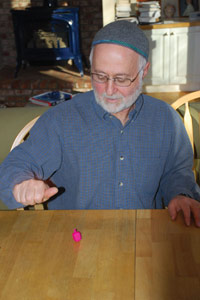Dreidel: A Yiddish word meaning "turn around." Sevivon: the Hebrew word for the same. The dreidel itself is a four-sided top, with a Hebrew letter on each of the four sides: nun, gimmel, hey, shin for a dreidel spun in the diaspora; nun, gimmel, hey, pei for a sevivon spun in Israel. The letters stand for A Great Miracle Happened There (Nes Gadol Hayah Sham) if you are spinning a top in, say, Asheville, or A Great Miracle Happened Here (Nes Gadol Hayah Poh), if you happen to be enjoying Hanukkah, the holiday when it is customary to play sevivon in Jerusalem, Tel Aviv, Beer Sheba, Haifa or anywhere else in Israel. Even playing a child's game, Jews are reminded where they are or where they are not in the world.

What pleasure we take, my wife, son and I, sitting at our kitchen table during the nights of Hanukkah, each of us with a pile of coins to bet, add to, or lose, taking turns twirling the top's stem between thumb and forefinger, hoping for a great spin. For the moments of the top's turning, we are fairly mesmerized by its graceful spinning, for its defiance of gravity to which, finally, it will succumb. Though we don't say it, I know that each of us feels the slightest pang of sadness as the dreidel, slowing, begins to wobble. But the sadness is tempered by anticipation of what side will be up when the dreidel finally drops to the table. Will we get a gimmel, our fortune increase? Will we get a shin and have to pay into the pot? A little bit of skill, a little bit of luck goes into the game.
Depending on who you hang with or where and when you happen to live (1967 in Jerusalem, 1933 in Berlin, 940 in Cordoba, 2009 in Biltmore Park, Asheville), the eight nights of Hanukkah celebrate either Jewish power, freedom or identity — or all three! The holiday celebrates the victory, in 164 BCE, of a small band of Jewish rebels, led by Judah the Maccabee, over the army of King Antiochus IV Epiphanes of the Seleucid Empire, thus enabling the Jews to rededicate the Temple in Jerusalem and return to the practice of Jewish ritual as commanded by God. If the triumph of the small over the mighty isn't miraculous enough, how about the miracle of the ritually pure oil found in the recaptured Temple, enough to last just one night, that burned for eight crazy nights?
Recently, rabbinic scholars, including Rabbi Irving Greenberg and Rabbi Matthew Kraus, have proposed another meaning for Hanukkah. They argue that the events of Hanukkah had less to do with political tensions between the Jews and the Syrian Greeks in power than it did with tensions at the time within the Jewish community itself over how Jews were responding to the influence of Hellenistic culture. Some Jews assimilated to Hellenism, some absorbed Hellenistic influences and transformed them in ways that enriched Jewish life, some resisted Hellenistic influences. Jewish loyalists, led by the Maccabees, may have been attempting to assert a purist approach to Judaism as the right way for Jews to preserve their unique identities when living among other peoples. Perhaps, ironically, the dreidel game itself represents one way in which Jews have absorbed something from another culture, adapting a German game and layering onto it a Jewish theme. We may have the Maccabbees to thank for restoring, for second Temple Jews, the freedom to return to full practice of Temple Judaism, but we have other Jews, whose approach to Judaism and Jewishness is more porous, to thank for the dreidel game and many other customs and practices that have been part of Judaism and Jewish culture for centuries.
How we live among others: that's something worth reflecting on whether we're a small minority of Jews in Asheville or Buddhists among Baptists, whites among blacks or blacks among whites, or Democrats among Republicans. As the dreidel spins gracefully, may we turn gracefully to face each other. When we wobble, as we all will, slowing down, may we use what little skill we have to comfort each other as we fall. In simple games that we can enjoy together, may we all be blessed with a little luck, and may sparks of hope illuminate us during this darkest time of the year.
Richard Chess is the author of several books of poetry, including Third Temple (University of Tampa Press). He directs the Center for Jewish Studiesand the Creative Writing Program at UNC Asheville.




Thanks for that great essay. I grew up Catholic, now atheist. Raised among many Jews and yet around 99% of your essay was new to me. Thanks!
Very nice article. A new look at a very old game.
Thanks for this piece, Mountain Express!